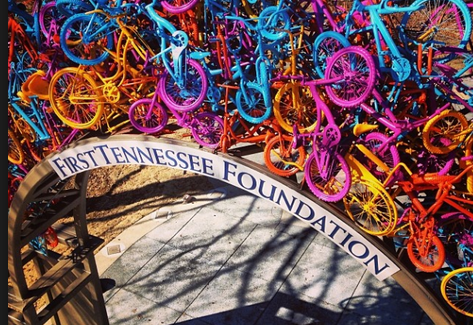
Antonio Gramsci, imprisoned by the Italian government in 1926 for his intellectual work, watched from his jail cell as fascism slowly consumed Europe. Disgusted with those ignoring the spread of totalitarianism, Gramsci wrote in his prison diary: “Indifference is the dead weight of history … nothing of what happens … is a matter of luck, nor the product of fate, but the intelligent work of the citizens.”
If you’re interested in the story of citizens working to make Memphis a better bike city, you’ll be disappointed by the recent article “Behind a Bicycling Boom: Governance, Cultural Change and Place Character in Memphis, Tennessee.”
The authors claim Memphis’ recent bicycle boom has created only “superficial changes to the city’s image” and effected no real change in “divisions along city and suburban lines, profound racial residential segregation, and stagnant population growth.”
Why? Because bicycle advocates in Memphis are an elite white “consumer citizen” class who, in partnership with Memphis Mayor A C Wharton’s government and local developers, crafted an “amenity-based urbanism” that reinforces their power.
Titillating though it is, the authors have a neat theory in search of a problem.
Their first mistake is portraying people on bikes as spandex-clad, helmet-wearing elites with no interest in truly connecting with people unlike them. Their second mistake is painting a portrait of bicycle advocates as an elite white class espousing connected communities while actually marginalizing poor non-white people.
The most recent U.S. Census reports the bicycle community roughly mirrors the demographics of the city at large: 53 percent of people on bicycles in Memphis are black, 37 percent are white, 4 percent are Asian, and 6 percent are listed as “other.”
What’s more, Memphis’ bicycle culture has shifted in the past five years from one dominated by spandex warriors to a culture filled with a growing group of daily commuters. If anything, the people being marginalized are “the bike guys” with helmets and spandex.
But more troubling is the authors’ assessment of bike advocates who, they claim, occupy a “class status higher than that of many of their fellow city residents.” Why? Because bike advocates possess “the command of capital” to support businesses that support bike lanes — turning bike advocates buying sandwiches at Fino’s into Andrew Carnegie-like capitalist magnates.
But the more damning implication of this argument is that less well off “fellow city residents” are too broke to do anything to revitalize their neighborhoods. Just as the authors rely on a false image of bike riders as spandex titans and bike advocates as white elites, they also rely on the condescending image of a poor and helpless citizenry.
Finally, the article is patently wrong about the South Main neighborhood. The authors claim the neighborhood is suffering from “racialized gentrification” because the black population around South Main fell from 43 percent in 2000 to 14 percent in 2012. (It’s worth noting the population of Hispanics and Asians in South Main doubled in the same period).
Despite the fact that artists drove South Main’s revitalization decades before Memphis had a bike lane, the authors attribute these demographic shifts to the failed “politics of bicycling.” These “bicycle politics” are even more despicable because they emptied out a black neighborhood less than a mile from the Lorraine Motel — connecting the failed politics of bicycling to the assassination of Dr. King.
I concede that bicycles haven’t bridged the urban/suburban divide or healed wounds of the King assassination. But they haven’t made them worse.
The city’s recent improvements for bikes have made Memphis a better place, and the authors might have understood this had they talked to Big Mike — the Ice Man — about his bike business. Or asked Sylvia Crum about the “kidical mass.” They could have talked to James Williams about his work to repair bikes for his neighbors near LeMoyne-Owen College. Or they could have talked to Megan at the YMCA about the Multicultural Achievers’ regular rides on the Greenline.
But they apparently didn’t talk to anyone in Memphis.
So what’s left? At best we have a cautionary tale about the need of “professional” thinkers to shoehorn a complex city full of people into a neat academic theory.
Anthony Siracusa is a graduate fellow in history at Vanderbilt University. He also serves as president of Bike Walk Tennessee.